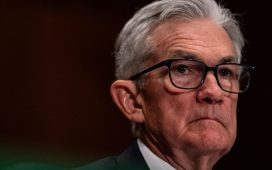Unlock the Editor’s Digest for free
Roula Khalaf, Editor of the FT, selects her favourite stories in this weekly newsletter.
Georgia’s governor Brian Kemp has dismissed White House efforts to take credit for an investment boom in the US and said the Biden administration’s vast cleantech subsidies had fanned inflation in his state.
The White House has pointed to Georgia’s fast-growing economy as an example of its strategy to revitalise US manufacturing capacity through generous tax breaks embedded in the Inflation Reduction Act signed into law by President Joe Biden in 2022.
But Kemp said the bonanza in his state had been driven by market forces and was under way before passage of the IRA — and claimed the extra federal stimulus was threatening to overheat Georgia’s economy.
“A lot of what the IRA has done, besides throwing money at something that was coming anyway, is also heated the market up and driven costs to go up,” Kemp told the Financial Times. “It’s really tried to manipulate the market, versus the market moving in that direction.”
The comments from Kemp, a moderate Republican who has clashed repeatedly with Donald Trump, come as the White House struggles to convince voters in crucial swing states like Georgia of its economic vision for the US.
The most recent FT-Michigan Ross poll showed 60 per cent of voters disapprove of how Biden is handling the economy, despite historically low unemployment, strong gross domestic product and wage growth, and record stock market highs.
Georgia’s economy has expanded by almost 8.5 per cent in real terms since Kemp became governor in 2019, amid an influx of capital commitments in sectors such as electric vehicle batteries that have made it a hub of the manufacturing revival in the US south-east.
The federal Treasury department said this week that Georgia had received almost $15bn worth of clean-energy project investments since the IRA passed in August 2022. FT analysis shows Georgia has also topped the list of states for cleantech investment since then. Almost all of the projects were planned for Republican districts, including Hyundai’s battery plants with LG and SK, and Hanwha Q Cells’ $2.5bn solar factory expansion.
Democrat Jon Ossoff, one of Georgia’s two US Senators, said the state’s boom was directly related to policies designed by the federal government.
“What we’ve seen since the passage of the Inflation Reduction Act is rapid growth of Georgia’s manufacturing sector,” Ossoff told the FT. “And that reflects that we crafted the legislation, both the infrastructure bill and the manufacturing incentives, to play to Georgia’s strengths.”
The investments in infrastructure since Biden took office in January 2021 marked “the most significant period of upgrades since the Eisenhower administration”, Ossoff added.
But much of the spending on infrastructure in Georgia had also been under way before Biden’s election, Kemp said, citing investments in Atlantic coast ports such as Savannah and Brunswick that had been sanctioned “long before any federal assistance”.
Georgia has offered significant sweeteners of its own to lure investors to the state, while Kemp has travelled across Europe and Asia in a bid to secure capital commitments.
Public policy experts say that the wave of cleantech investment is down to a mix of state and federal incentives.
“It’s not necessarily the decision to invest or transition to EVs that the federal government is entirely responsible for,” said Glencora Haskins, of the Brookings Institution think-tank. “But the tax incentives are helping companies make the decision to speed up investment and to ensure manufacturing is happening in the United States.”
Kemp, who was re-elected governor in 2022, blamed Biden’s pandemic stimulus spending for sparking a surge in US inflation, which hit a multi-decade high in 2022 before drifting lower in the past year.
“[The federal government] spent way too much money coming out of the pandemic,” he said. “At a time when we should have been urging people to get back in the workforce, the Biden administration was paying people to stay home.”
Kemp, considered a future Republican presidential candidate, has drawn the ire of Trump for rejecting his efforts to overturn the 2020 election, and has warned the party it will lose the White House race again in 2024 if it continues to recite the former president’s false claims.
But he insisted that “all of the Republicans running would do better than Joe Biden” in the coming election.
While voters across the US remain gloomy about the booming economy, consumer sentiment has recently picked up, with the closely watched University of Michigan sentiment index recently hitting its highest level since July 2021.
Additional reporting by Amanda Chu










